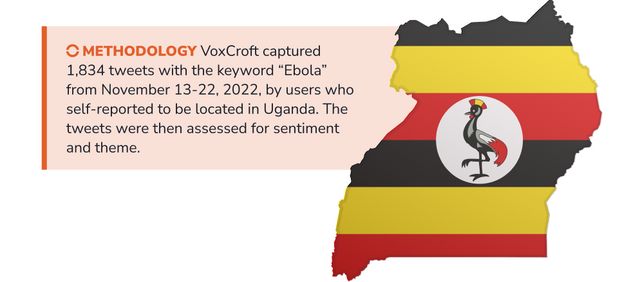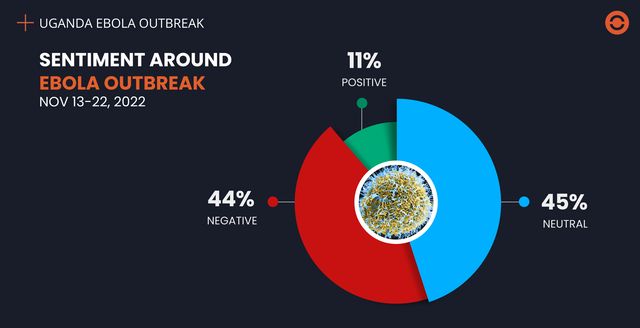

Uganda: Ebola Discourse Indicates Low Public Trust In Government
February 1, 2023 · 2 min read
-

Uganda’s recent Ebola outbreak generated widespread public criticism of the government, according to an open-source study of almost 2,000 tweets from November 13-22, 2022. Indeed, sentiment toward the Ugandan government was majority negative, at 75 percent. The data show a general lack of trust in public health measures—including as a result of previous COVID-19 measures—and suggests Ugandan officials could face public perception challenges in responding to future health crises. In contrast, Ugandans gave more positive reviews to international health agencies, particularly the World Health Organization (WHO), during the outbreak.

VoxCroft’s open-source tools revealed a public focus on the general response, government-imposed lockdowns/restrictions, and various conspiracy narratives. Negative and neutral sentiment dominated, accounting for a cumulative 89 percent of the data—with lockdowns/restrictions and conspiracy/corruption themes driving much of the negativity.

KEY FINDINGS:
-
Anti-Government Discourse Alleges Conspiracy, Corruption. The conspiracy/corruption theme was the third most prominent in the dataset, within which 82 percent of tweets were negative. The dominant narrative accused the Ugandan government of fabricating the Ebola outbreak to attract foreign aid. For example, in response to an Ebola update from President Yoweri Museveni’s Twitter account, one user stated “I know how your regime operates. It’s factual that there is no Ebola in Uganda. When poverty hits the regime, they return to their tactics of getting money from donors.” Another user insisted that Museveni would “use all measures to solicit funds from donors which he will use to continue his acts of human rights abuses. The #covid funds were stolen and #EBOLA funds will be diverted.”
-
Lockdowns, Similar Restrictions Unpopular Post COVID-19. Ugandans expressed a limited appetite for lockdowns and other restrictions akin to those imposed during the COVID-19 pandemic. Indeed, the theme garnered 63 percent negative sentiment. For instance, one user tweeted “We have had Ebola several times, with few deaths and recoveries, totally contained without lockdowns. However, ever since we adopted lockdowns during COVID-19, we dwarfed and narrowed minds to only one solution, that seems to be beneficial to a few opportunists.”
-
Negative Sentiment Mainly Targets Ugandan Government. Ugandan Twitter users commented on the various public health measures implemented in response to the Ebola outbreak, including vaccine trials, testing stations, and volunteer worker mobilization. While the bulk of this was neutral, a third consisted of measurable sentiment-bearing data, almost evenly split between positive and negative. Interestingly, positive tweets centered around aid from external entities, especially the WHO. Meanwhile, negative items primarily targeted the government.

Governments and health agencies can better respond to crises in a timely and effective manner with the right intelligence. VoxCroft’s tools help to cut through the noise to listen to the voice of the people, allowing for rapid tracking of opportunities and risks as they evolve in a health crisis.